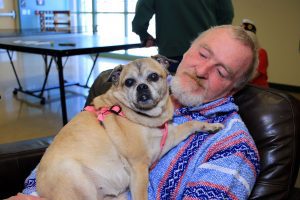
SCRANTON – Rosey, who just turned 14 years old last month, can be described in many ways. The Jack Russell/Pug mix is both a confidant and family member to her human companion, Douglas Howe, but he describes her in one additional way.
“She has been my protector,” he said.
As a veteran, Howe does not use those words lightly.
“She has been around me from birth … I take her everywhere. I take her to the store, I take her to the hospital when I have my appointments. She gets more attention than I think I’ll ever get,” he joked.
When Howe moved into Saint Francis Commons, an affordable, transitional housing facility for veterans experiencing homelessness last August, he was initially concerned he wouldn’t be able to bring Rosey.
“It was a huge concern. We stick to each other like glue. I take care of her all the time and she takes care of me,” Howe said.
It turns out Howe’s fears would be unfounded.
Catholic Social Services of the Diocese of Scranton operates Saint Francis Commons. In 2019, the agency launched its Curative Companions Program that allows veterans and other traumatized persons who are living in Catholic Social Services housing and shelters to have the opportunity to heal and thrive through the love of a therapeutic pet.
“We noticed almost immediately how much of an impact the animals made on the veterans, Ryan Pollock, Program Director of Saint Francis Commons, said. “We had veterans that would be coming out of their rooms to interact with the animals that didn’t typically interact with the other veterans.”
Scott Pence has been living at Saint Francis Commons for eight months. Four months ago, he got a newborn German shepherd named Sasha.
“She is my best friend. She’s a companion and she just means the world to me,” Pence said. “I’m with her 24 hours a day. We play together all the time and she’s just adorable.”
Pence believes Sasha has helped him ‘break the ice’ and get to know many of the other veterans staying at Saint Francis Commons.
“They all love her. She’s just a pup and easily excited,” he explained.
John Lipscomb, who cares for Angel, a two-year-old black lab, agrees.
“We have a couple other vets here who even will take her for walks because I can’t walk very far,” Lipscomb explained.
He says the love and companionship Angel provides him is extremely important since he recently left rehab.
“She’s the reason I want to keep living and want to do better … It gives me a purpose in life. I lost everything and she gives me good reason to get out of bed in the morning,” he added.
The Curative Companions Program is in need of financial assistance to stay in operation and provide services to even more veterans.
Pollock says several other veterans have asked about getting an animal.
“All of our veterans are low income and anybody that wants to have an emotional support dog, we don’t want finances to be a barrier,” he explained.
On average, it costs $2,000 annually for a pet between food, supplies, vet visits and other expenses.
The Curative Companions Program was made possible through the generosity of its initial funder The Robert H. Spitz Foundation, and then a later sustaining contribution by the PNC Foundation. Through its administration of the Spitz Foundation, the Scranton Area Community Foundation, which additionally has supported other Catholic Social Services programs, also has been an instrumental partner.
Dr. Paws of Scranton has also made substantial in-kind contributions and has provided some no-charge veterinary and follow-up care to some animals.
Anyone looking to support the Curative Companions Program can contact Ryan Pollock at (570) 209-9200, x2302. People will also be able to support the program on NEPA Gives Day, Friday June, 3, 2022, at nepagives.org.
